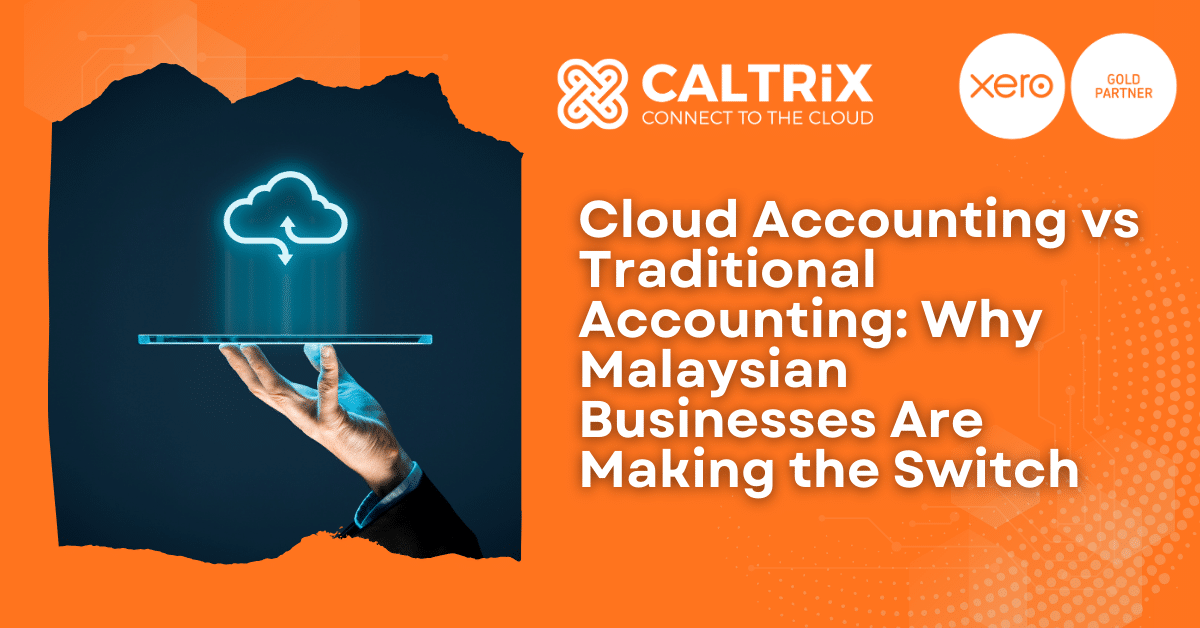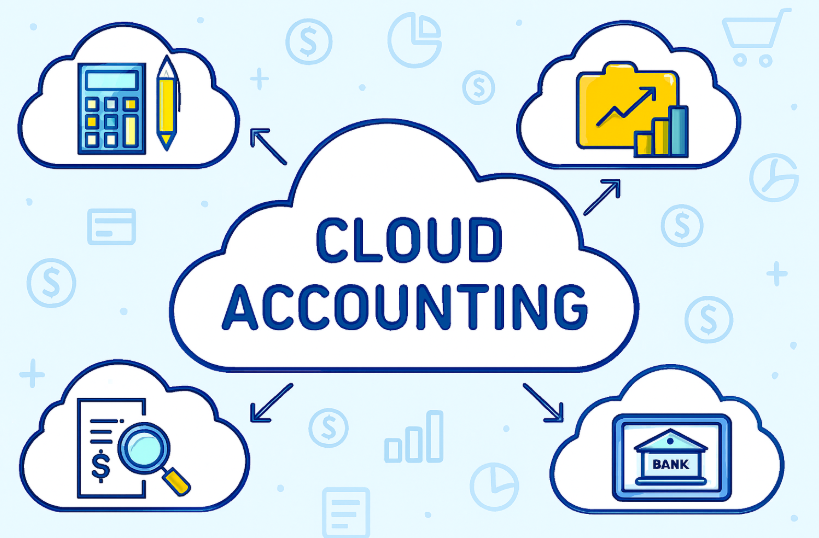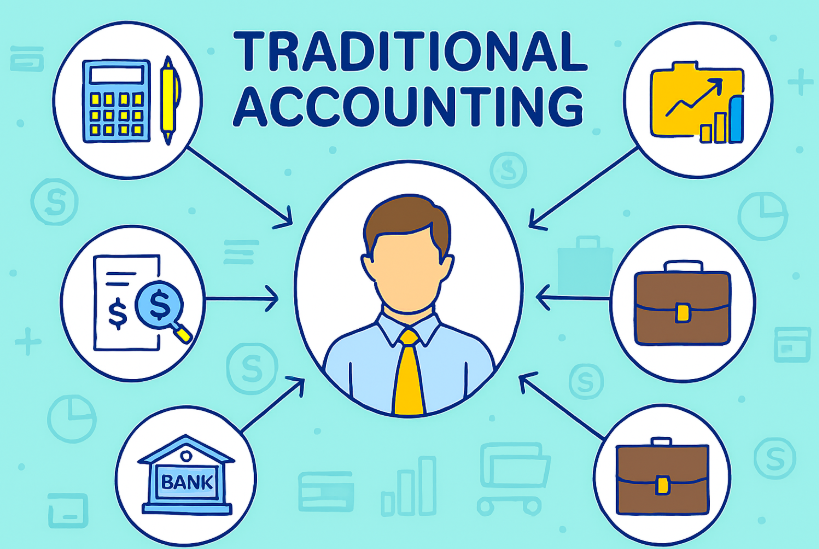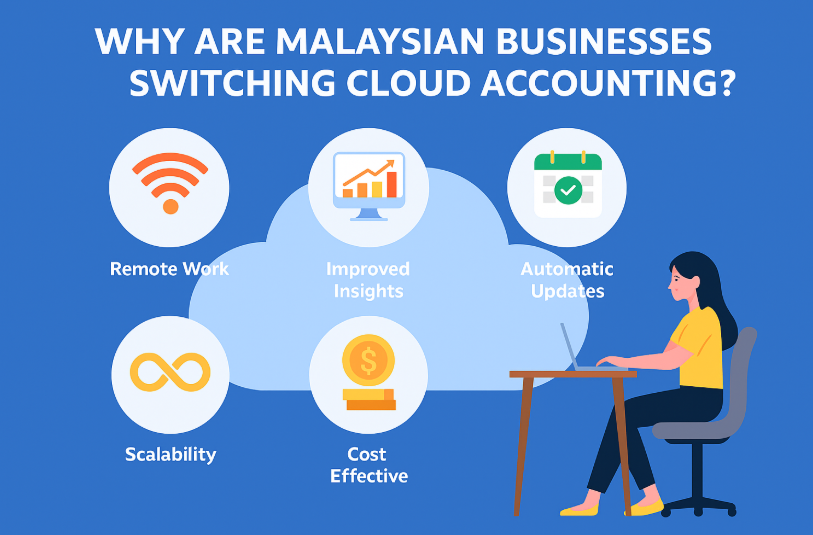In today’s fast-paced business environment, Malaysian businesses are increasingly opting for cloud accounting software over traditional accounting systems. This shift reflects the growing trend of accounting modernization in Malaysia, where businesses, including small and medium businesses, are looking for more efficient, flexible, and scalable ways to manage their financial data. This transition is not only about core accounting functions but also about improving inventory management, cash basis accounting, and other critical operations.
But what exactly makes cloud accounting so appealing, and why are businesses leaving behind traditional accounting methods for cloud-based solutions?
What is Cloud Accounting?
Cloud accounting software refers to the practice of using cloud-based systems to manage financial records online. Unlike traditional accounting, which relies on desktop accounting software and physical files, cloud accounting allows businesses to access and manage financial data from anywhere, as long as there is an internet connection.
This approach automates several key accounting functions, such as expense tracking, invoice processing, and tax compliance, which saves businesses valuable time and reduces the risk of errors. With cloud software, businesses can easily update and maintain their records without worrying about complex software upgrades that are common with desktop accounting solutions.
With cloud accounting software, financial information is securely stored on remote servers, protecting it from physical damage or loss. Plus, cloud accounting providers offer real-time access to financial data, which enables businesses to track cash flow and generate financial reports instantly. Cloud computing also makes it easy for businesses to scale operations, as it can seamlessly integrate new tools and features without the need for costly hardware or desktop systems. Popular examples of cloud accounting platforms include QuickBooks Online, Xero, and FreshBooks.
The ability to access financial records from anywhere, combined with automated features, is revolutionizing the way small and medium businesses handle their accounting processes. In fact, many businesses are finding that cloud computing replaces PCs in managing their day-to-day operations, offering more flexibility and eliminating the need for constant software upgrades.
What is Traditional Accounting?
Traditional accounting is the conventional method of managing financial data using desktop systems and manual processes. This system typically involves keeping track of financial transactions, preparing financial reports, and managing tax filings using desktop accounting software or physical records. Traditional accounting systems store data on local servers or individual computers, and updates are done manually, often requiring face-to-face collaboration and physical paperwork.
In contrast, cloud-based systems offer greater flexibility by allowing businesses to access accounting data remotely and automatically update records in real time. Traditional accounting systems require businesses to manually update and back up their financial records, which can lead to delays and errors, affecting business operations and decision-making. With cloud-based accounting, businesses no longer need to worry about manual data entry or managing physical paperwork.
For accounting firms still using traditional accounting, this reliance on manual processes can create inefficiencies, making it difficult to scale as client bases grow. In addition, the time-consuming nature of traditional methods can reduce a firm’s ability to respond quickly to client needs, slowing down critical tasks such as financial reporting or tax filing.
In essence, traditional accounting is often time-consuming and prone to errors, but it remains common in businesses and accounting firms that haven’t yet transitioned to cloud accounting.
Cloud Accounting vs Traditional Accounting: The Key Differences
1. Accessibility and Convenience
With cloud accounting, businesses can access their financial data from any device with an internet connection. This is ideal for businesses with teams working remotely or across multiple locations. In contrast, traditional accounting typically restricts access to desktop accounting software, meaning you need to be in a specific location to update or review financial records.
Cloud accounting software enhances collaboration and decision-making by allowing multiple team members to access the financial data at the same time. Whether you’re in the office or working remotely, cloud accounting provides unparalleled convenience. Additionally, it reduces manual data entry and minimizes the need for repetitive tasks, allowing businesses to streamline operations and improve overall efficiency.
With cloud accounting, third-party access becomes easier, allowing external accountants or auditors to securely review financial data without requiring physical presence. This flexibility is especially beneficial for small businesses that need to collaborate with external professionals without the complications of traditional systems.
2. Cost-Effectiveness
One of the most significant advantages of cloud accounting software is its affordability. Cloud-based solutions often operate on a subscription basis, meaning businesses pay for only what they need, reducing upfront costs for accounting software and hardware. On the other hand, traditional accounting requires substantial upfront investments in software and hardware.
For example, businesses that once spent large sums on desktop software can now switch to cloud solutions that offer pay-per-use models, drastically reducing their costs. Cloud accounting is more scalable, meaning businesses can expand their usage without purchasing additional hardware or software.
A report found that cloud accounting can reduce operational expenses by up to 50%, thanks to lower IT overheads and the elimination of the need for physical storage.
3. Automation and Real-Time Data
Cloud accounting systems automate many processes, such as invoice processing, tax calculations, and payroll management, which reduces the likelihood of human error. These systems update financial data in real-time, giving businesses instant insights into their financial health. The seamless integration of cloud accounting with other business tools further enhances efficiency, making it easier to manage various operations from a single platform.
Traditional accounting systems, on the other hand, often require manual updates, which can lead to outdated or inaccurate data. With cloud-based systems, small businesses can stay ahead by receiving real-time insights and automated reports. This ensures data accuracy and reduces the risk of errors in financial reporting.
This real-time update is a huge advantage for financial management. Business owners no longer need to wait for month-end reports or manually enter data. They can make informed decisions at any time, improving operational efficiency and agility.
4. Security and Data Backup
Security is a top priority when it comes to financial data. Cloud accounting providers offer robust security measures, including data encryption and multi-factor authentication, to protect sensitive financial transactions. With cloud-based systems, businesses benefit from automatic backups and the security of remote servers.
In contrast, traditional accounting systems rely on manual backups and physical storage, which can expose businesses to greater risks of data loss or breaches. If a local server crashes, the entire accounting system can be compromised, and restoring the data may be difficult or even impossible without proper backups.
5. Collaboration and Sharing
For businesses with multiple users or external accountants, cloud accounting offers superior collaboration. Multiple users can access the system at the same time, enabling seamless collaboration and faster decision-making.
Traditional accounting systems, however, require data transfer between devices or physical locations, which can slow down collaboration and introduce the risk of data discrepancies.
Why Are Malaysian Businesses Switching?
Several factors are driving the adoption of cloud accounting software among Malaysian businesses, including the need for greater efficiency, cost-effectiveness, and flexibility.
1. Government Support for Digital Transformation
The Malaysian government has been actively promoting digital transformation through initiatives like MyDIGITAL, which aims to modernize industries, including accounting systems. According to a 2023 report by the Malaysian Digital Economy Corporation (MDEC), over 70% of Malaysian SMEs have already started adopting cloud solutions, including cloud accounting.
2. Cost-Effectiveness and Flexibility
Cloud-based accounting systems offer businesses the flexibility to pay for only what they need, reducing overall costs compared to traditional accounting systems that require large upfront investments in software and hardware. A QuickBooks report found that cloud accounting can lower costs by up to 50%, thanks to its subscription-based model and lack of maintenance requirements.
3. Real-Time Access and Collaboration
The ability to access financial data in real-time is crucial for businesses that need to make quick decisions. A Xero study found that businesses using cloud-based accounting software saw a 40% improvement in the speed of financial reporting, enabling faster decision-making.
4. Automation and Time-Saving
Cloud accounting automates routine tasks, such as expense tracking, invoice processing, and tax compliance, saving businesses valuable time. According to an Intuit QuickBooks survey, businesses that switched to cloud-based systems saved an average of 8 hours per week on administrative tasks.
5. Security and Data Protection
With cloud accounting software, businesses benefit from advanced security measures like data encryption and automatic backups, ensuring that financial records are protected. A 2021 Deloitte report revealed that 87% of Malaysian businesses consider data security a key benefit of cloud accounting over traditional systems.
6. Scalability and Business Growth
As businesses grow, their accounting needs become more complex. Cloud accounting provides the scalability that traditional accounting systems lack. Businesses can easily add new users, expand to multiple locations, and integrate with other business tools as needed. This scalability allows businesses to continue using the same software as they grow, without having to constantly upgrade or replace their accounting systems.
Conclusion
As cloud accounting continues to reshape the way Malaysian businesses manage their financial operations, Caltrix offers tailored solutions to help businesses transition seamlessly from traditional accounting systems. With our expertise in cloud accounting and commitment to ensuring data security, businesses can streamline their financial processes, improve collaboration, and focus on growth.
By partnering with Caltrix, you can leverage the benefits of cloud-based systems and ensure that your accounting functions are efficient, secure, and scalable. Let Caltrix help you modernize your accounting system and take your business to the next level with cutting-edge cloud accounting software.





